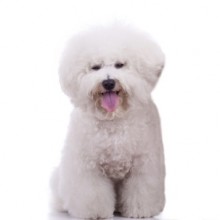Bichon Frise
Lifestyle Needs

The Bichon Frise is usually a joyful little character – very small, with abundant hair which needs daily attention. Breed experts say that the Bichon’s hair needs to be combed thoroughly on a daily basis. Light brushing is not enough and will result in matting. A prospective owner needs to be prepared to give the time to this. He is definitely a lap dog and needs his home comforts, but like all dogs he also needs daily exercise. They need consistent but fair reward based training as some Bichons can be head strong. Bichons love to be part of the family and to participate in all family activities.
Genetic Diversity
(Known as Coefficient of Inbreeding: 'COI'. It should be as low as possible.)
The UK Kennel Club breed average COI is 10.8% - See 'A Beginners Guide to COI'
Gene Pool Size
(Known as Effective Population Size: 'EPS')
80.2
EPS is a measure of how many individuals are contributing genetically to a breed population. It is a measure of the size of the gene pool in a breed. Lower than 100 is considered critical by conservationists and below 50 brings a breed close to extinction. For more information see the Kennel Club article.
Health and Welfare Problems due to Conformation
(Body shape and physical characteristics)
- The Bichon’s coat definitely cannot be left to its own devices. If it is not groomed daily and trimmed regularly, skin problems and a great deal of discomfort will result.
BVA/KC Health Schemes: www.bva.co.uk/chs
- Eye disease: Hereditary cataract (HD) and other eye diseases.
Full ophthamological testing required before breeding
Estimated Breeding Values (EBVs) : No EBVs are currently available for this breed
www.thekennelclub.org.uk/about-ebvs
DNA Tests Available
DogWellNet and IPFD Harmonisation of Genetic Testing for Dogs (HGTD)
www.dogwellnet.com/breeds
None currently recommended
Availability of a DNA test does not mean that it is always necessary or even desirable for breeders to use this test.
Other Breed-Specific Health Screening Schemes
- BAER testing (deafness)
- Putnam scoring for patella luxation
Ask the breeder to show you the certificates for the above tests/screening for both parents. If any of the above tests have not been considered necessary by the breeder (and there may be good reasons), ask her to explain why.
Other Diseases Reported
(For which there are currently no genetic or screening tests for sire or dam)
- Atopic dermatitis
- Cushings disease
- Dental problems
- Ear infections
- Mitral Valve Disease (MVD)
Ask the breeder about the medical history of the parents, grandparents and great grandparents. Consider carefully whether to purchase a puppy if some of these or other diseases are in the family line.
Ask about the breeder’s policy in cases of serious genetic diseases occurring to your puppy in later life. Good breeders will request to be informed of such events in order to improve future breeding decisions.
You are strongly advised to buy from a breeder who uses (or is prepared to use) the AWF Puppy Contract and Puppy Information Pack (PIP): www.puppycontract.org.uk
The breeder should also be familiar with the CFSG/DBRG Code of Practice for Dog Breeding